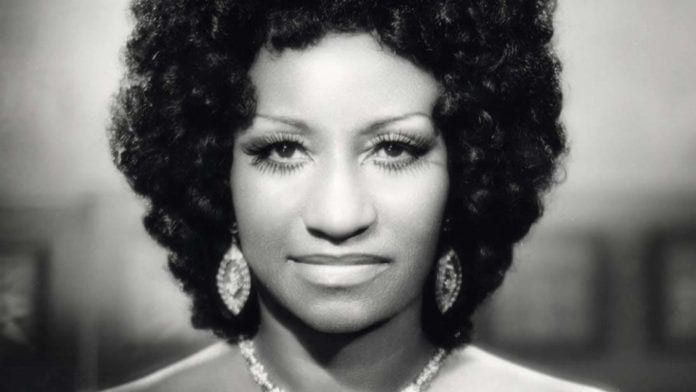Ursula Hilaria Celia de la Caridad Cruz Alfonso was born in Havana, Cuba, on October 21, 1925. Widely known as Celia Cruz, this once New Jersey resident was a famous Cuban singer. She grew up in Santos Suárez, a working-class neighborhood. Celia was the second of four children, all raised by a single mother with help from extended family. She often helped take care of the family, using her talents to sing her siblings and cousins to sleep.
The 1930s was a great decade for music. Celia Cruz grew up around diverse musicians and never-before-heard styles; for example, she listened to artists like Fernando Collazo, Pablo Quevedo and Arsenio Rodríguez. After Cruz graduated from high school, she attended the Normal School for Teachers in Havana; she intended to become a literature teacher. During her studies, she was inspired to become an entertainer and even received motivation from an academic teacher. The teacher told Cruz she’d make more in a day as an entertainer than Cuban teachers made in a month. Cruz was sold.
Early Career
In 1947, Cruz began studying music theory, voice and piano at the National Conservatory of Music in Havana. Soon after, she was a contestant on a daily radio broadcast; she placed first in a singing competition during the event. Cruz went on to win several singing competitions, and in 1948, she recorded her first songs in Venezuela.
Celia Cruz began singing with the distinguished Cuban group La Sonora Matancera in 1950; she joined after being discovered by Myrta Silva, the group’s singer. Throughout the 1950s, Cruz’s ongoing success led her name to become more well-known than her band’s.
In 1959, communist dictator Fidel Castro gained control of Cuba. The following year, Cruz and her band settled down in the United States after a brief Mexico tour. Castro would not allow Cruz or any other Cuban musicians who were out of the country back into Cuba. When Cruz tried to return after her mother’s death, she was denied and consequently became a U.S. citizen.
This did not cease her successful musical career, however. She began performing with Tito Puente in the mid-1960s and even recorded eight albums with him. She then worked with renowned pianist Larry Harlow and, soon after, began headlining at major venues; specifically, she performed at Carnegie Hall in New York City. In the 1970s, Cruz worked with Dominican multi-instrumentalist Johnny Pacheco. The duo’s 1974 album, Celia y Johnny, was an immediate success. Over the next 13 years, Celia Cruz also made several albums with Nuyorican salsa musician Willie Colon; the two met when she took part in a documentary titled Salsa, which chronicled Latin culture.
Continued Success for Celia Cruz
The 1980s brought upon some of the most successful years in Cruz’s career. She was just starting to gain traction outside of the Americas. One of her biggest shows came in 1980, when she performed at the Olympia in Paris, France. She also became the voice of WQBA radio station in Miami, Florida. In the late 1980s, she starred in the feature-length U.S. film, Salsa (unrelated to the 1970s documentary). Cruz won a Grammy award for “Best Tropical Latin Performance” in 1989. She would go on to be nominated for 14 more Grammy awards, winning three of them.
In 1994, Celia Cruz won the National Medal of Arts, presented by President Bill Clinton. Cruz also was inducted into Billboard’s Latin Music Hall of Fame that same year. Over the next decade, she saw continued success; she performed around the world and recorded with artists like Dionne Warwick, Marc Anthony and Gloria Estefan.
Cruz eventually settled down with her husband, Pedro Knight, in Fort Lee. On July 16, 2003, Cruz died of brain cancer in her New Jersey home. Several days later, more than 200,000 friends, family members and fans visited the Freedom Tower in Miami; her body was brought here so fans could pay their respects. Cruz’s legacy lives on and will forever inspire the masses to follow their talents and live their dreams; just as Celia Cruz did.
For more stories celebrating amazing New Jersey women, be sure to visit our Women’s History NJ page!
Hero (Top) Feature Image: © Smithsonian Institute / Celia Cruz Website
Additional Images (in Order) Courtesy:
Ibrahim Arce / Wikipedia
Ibrahim Arce / Wikimedia Commons














